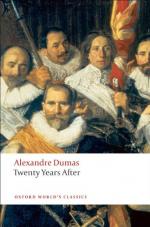The queen looked around her for some sacred object by which she could swear, and taking out of a cupboard hidden in the tapestry, a small coffer of rosewood set in silver, and laying it on the altar:
“I swear,” she said, “by these sacred relics that Buckingham was not my lover.”
“What relics are those by which you swear?” asked Mazarin, smiling. “I am incredulous.”
The queen untied from around her throat a small golden key which hung there, and presented it to the cardinal.
“Open, sir,” she said, “and look for yourself.”
Mazarin opened the coffer; a knife, covered with rust, and two letters, one of which was stained with blood, alone met his gaze.
“What are these things?” he asked.
“What are these things?” replied Anne, with queen-like dignity, extending toward the open coffer an arm, despite the lapse of years, still beautiful. “These two letters are the only ones I ever wrote to him. This knife is the knife with which Felton stabbed him. Read the letters and see if I have lied or spoken the truth.”
But Mazarin, notwithstanding this permission, instead of reading the letters, took the knife which the dying Buckingham had snatched out of the wound and sent by Laporte to the queen. The blade was red, for the blood had become rust; after a momentary examination during which the queen became as white as the cloth which covered the altar on which she was leaning, he put it back into the coffer with an involuntary shudder.
“It is well, madame, I believe your oath.”
“No, no, read,” exclaimed the queen, indignantly; “read, I command you, for I am resolved that everything shall be finished to-night and never will I recur to this subject again. Do you think,” she said, with a ghastly smile, “that I shall be inclined to reopen this coffer to answer any future accusations?”
Mazarin, overcome by this determination, read the two letters. In one the queen asked for the ornaments back again. This letter had been conveyed by D’Artagnan and had arrived in time. The other was that which Laporte had placed in the hands of the Duke of Buckingham, warning him that he was about to be assassinated; that communication had arrived too late.
“It is well, madame,” said Mazarin; “nothing can gainsay such testimony.”
“Sir,” replied the queen, closing the coffer and leaning her hand upon it, “if there is anything to be said, it is that I have always been ungrateful to the brave men who saved me — that I have given nothing to that gallant officer, D’Artagnan, you were speaking of just now, but my hand to kiss and this diamond.”
As she spoke she extended her beautiful hand to the cardinal and showed him a superb diamond which sparkled on her finger.
“It appears,” she resumed, “that he sold it —–he sold it in order to save me another time — to be able to send a messenger to the duke to warn him of his danger — he sold it to Monsieur des Essarts, on whose finger I remarked it. I bought it from him, but it belongs to D’Artagnan. Give it back to him, sir, and since you have such a man in your service, make him useful.”




